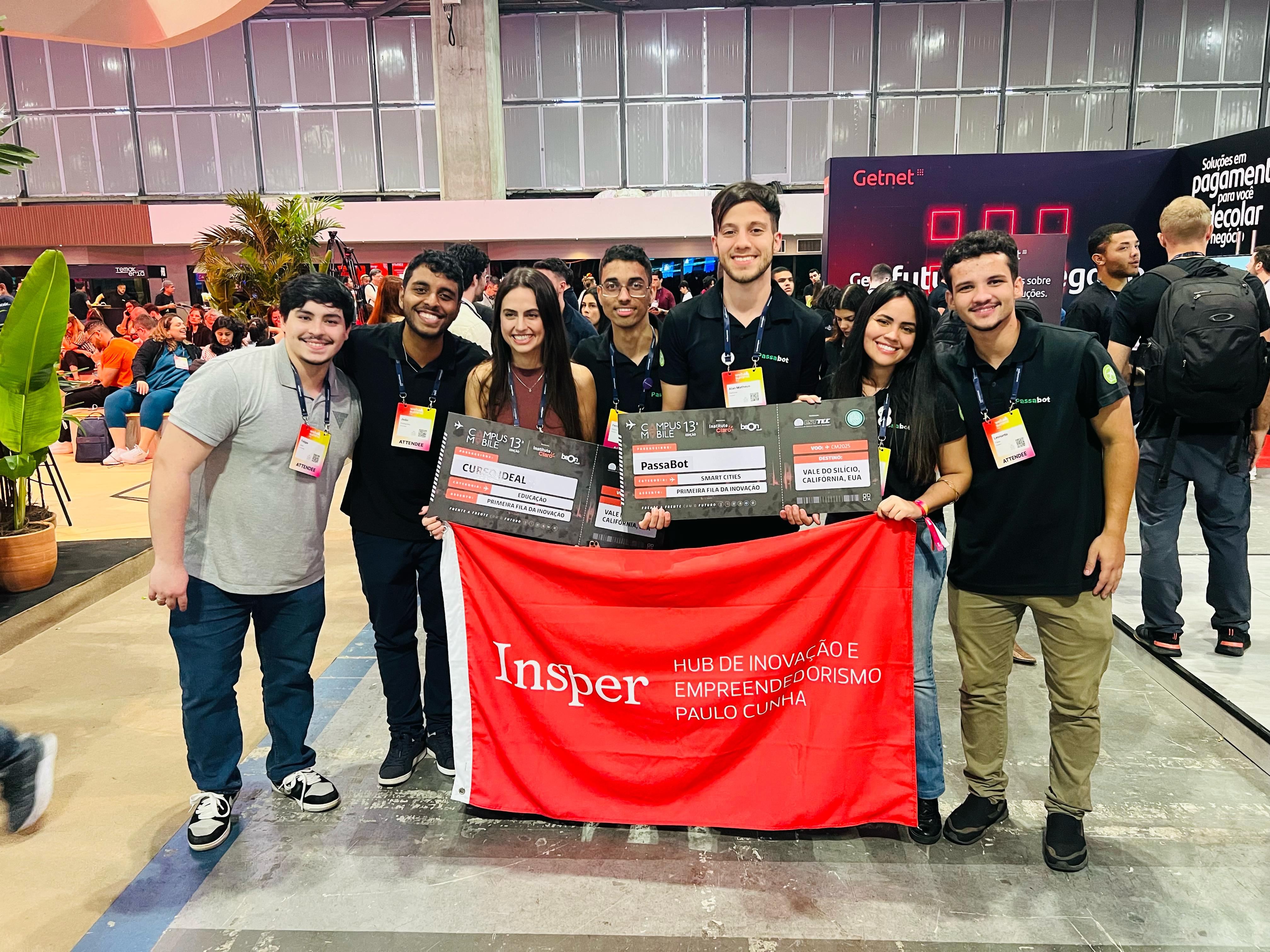Two groups of Insper students were among the winners of the 13th edition of Campus Mobile, a national competition of ideas and solutions for mobile devices, promoted by Instituto Claro. In the Education category, Gabrielly Carneiro Susko, from the Computer Engineering program, won with the project Curso Ideal. Alan Matheus Alves Barbosa, from the Computer Science program, took first place in the Smart Cities category with the project PassaBot. Fernando Vieira dos Santos, also from Computer Science, is one of the founders of PassaBot but was registered for Curso Ideal.
Registered as Horizontes and renamed during the competition, Curso Ideal is a prototype application that recommends academic and professional opportunities according to the user's interests. “Now that we have a functional version of our platform, our next step is to run a pilot plan with a partner school, to validate the impact of our solution in a real context and, based on this proof, scale the project to impact students across the country,” says Gabrielly. The group also includes students João Guimarães and Marcio Vicente, from the Instituto Tecnológico de Aeronáutica (ITA), and Felipe Leão, from the Instituto Inteli.
PassaBot is a robot that sends options for flight tickets via WhatsApp message. “Our goal was to help other scholarship holders in purchasing cheaper flight tickets, because we found ways to save up to half the price and didn't want to keep that to ourselves,” says Alan. Besides him, the project was developed independently by Bianca Freitas, who graduated from Unicamp, and Leonardo Piana, an ITA student. During the competition, Fernando joined Alan in developing PassaBot and switched groups but ended up collaborating unofficially as he was registered as a member of Curso Ideal.
Alan highlights the contribution he received from the Paulo Cunha Innovation and Entrepreneurship Hub at Insper through mentoring and setting up a booth at the Web Summit, held in April in Rio de Janeiro. “This network of contacts that Insper provided us was incredible,” says Alan. He also mentions that the group received support from Unicamp and ITA, educational institutions of the other members of PassaBot.
Gabrielly recalls the challenges encountered throughout the project, especially when the initial members couldn't continue in the competition. “I almost gave up participating,” she says. “It was during this period that I ended up meeting João, who was developing, with some friends, an education project very similar to what I was doing with Horizontes. The connection of ideas and purpose was immediate, and we saw an opportunity to strengthen the project by combining the team's skills, visions, and energy.”
According to Professor André Santana, who accompanied the teams from the beginning of the competition, Curso Ideal is a clear example of how extracurricular activities help turn learning into practice. “What caught my attention the most was the effort to test and validate the proposal with real people, including psychologists and potential users,” says Santana. “This movement of listening and co-creating generated relevant insights to make the solution more viable and sustainable. There was a consistent effort in aligning the user journey with a realistic business model, demonstrating maturity in facing a complex problem.”
Santana notes that PassaBot stood out for the clear way it communicated its proposal and focused on solving a real problem. “The team was able to clearly convey the value of the solution with a narrative close to the user, making the proposal relevant and easy to understand. By prioritizing functionalities genuinely desired by those seeking to save on tickets, they successfully demonstrated concrete impact and reinforced the credibility of the project,” says Santana.
The participation of students in similar initiatives demonstrates how extracurricular projects function as living learning laboratories, where competencies such as resilience, collaboration, and practical application of academic concepts are put into practice in a real context, Santana adds.
The winners received a prize of 9,000 reais and will travel to Silicon Valley, USA, where they will visit educational institutions and technology companies. They had already won 2,700 reais for reaching the finals in February this year.







